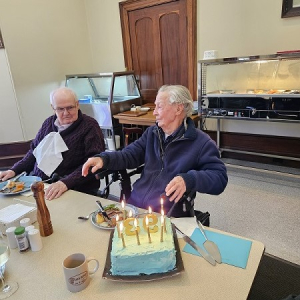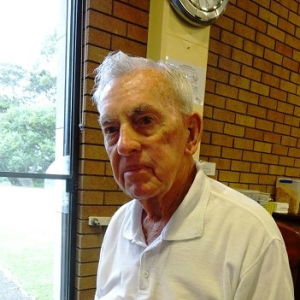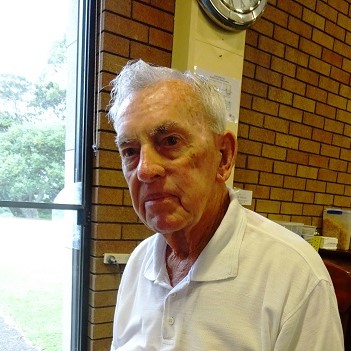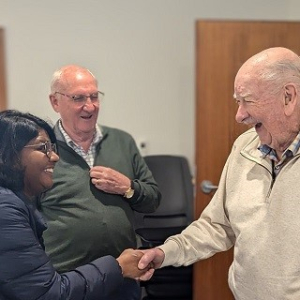Peter MALONE
Some recent Province photos
Some recent Province photos
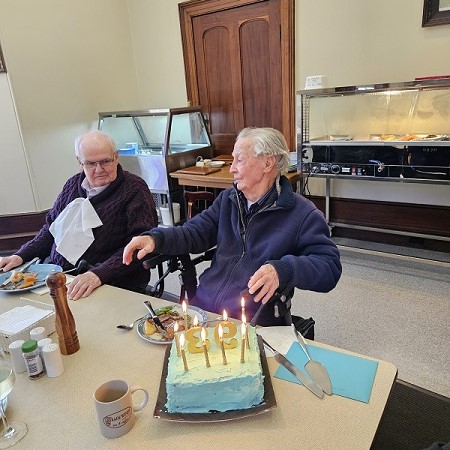
Steve Dives sent this photo of Len Helm celebrating his 93rd birthday this week with the Douglas Park community (with Peter Curry).
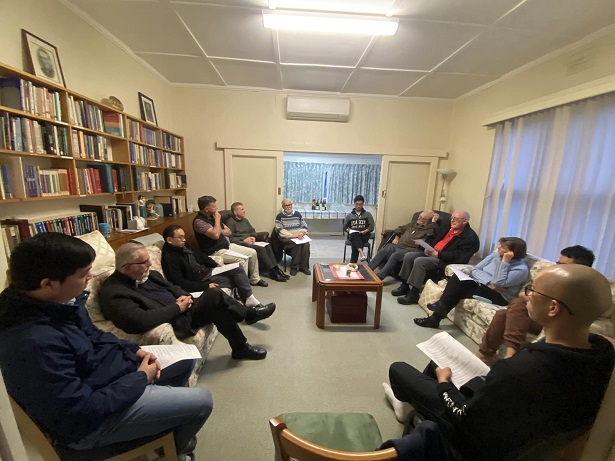
Alison McKenzie, Interim Director of Heart of Life, joins the Melbourne community for its monthly meeting.
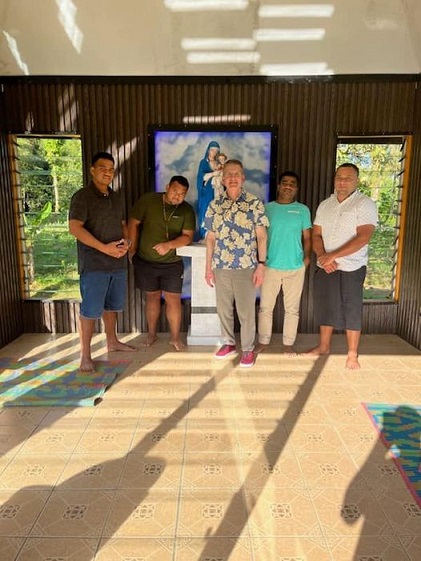
Dominic Gleeson in Fiji for the 30-Day retreat with our MSC novices.
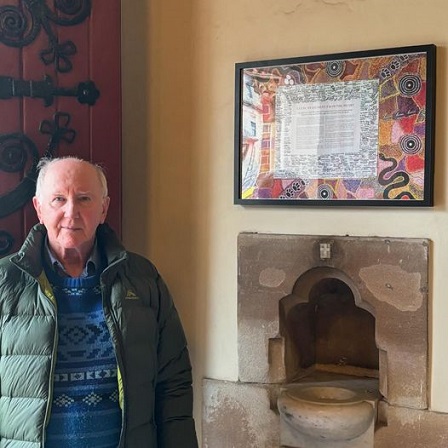
Randwick. Bill Brady has kindly organised framed copies of the Uluṟu Statement to be displayed in our Parish Churches. As a community, we recognise the Gadigal people of the Eora Nation as the traditional custodians of the land on which we gather and pray, and extend our respect to all Indigenous Australians, particularly those who are part of our Parish community.
Shared from John Walker’s Facebook page.
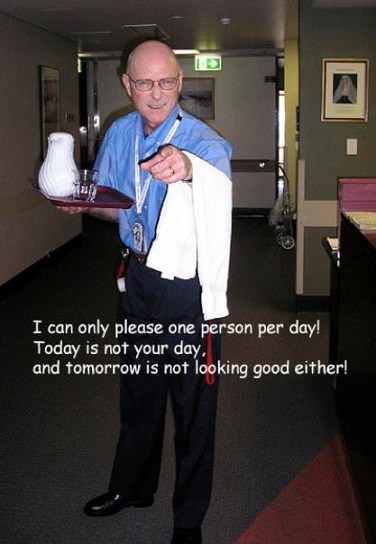
Fortunately, we had not seen the photo and threat when he was asked to write the Analecta history.
Papa o Mama/ You Keep the Kids

PAPA O MAMA/ YOU KEEP THE KIDS
Spain, 2021, 90 minutes, Colour.
Paco Leon, Miren Ibarguren, Sofia Oria, Ivan Renédo, Laura Quiros.
Directed by Dani de la Orden.
A Spanish comedy about marriage and divorce – and the children. It is actually based on a French film made a few her years earlier, Papa ou Maman, but it has universal themes and could be remade in most cultures.
The film is billed as a comedy and there are very many funny sequences – but, the tone is particularly wry, the treatment of marriage, the cooling of relationship in a marriage, the increasing number of children, careers and promotions, spouses wanting to go their own way, divorce, litigation – and the custody of the children.
Quite a deal of time is spent in setting up the characters of Victor and Flora, the parents, as well as their three quite distinctive children. The main part of the action is the separation, the consequences of life in the family, discussions with the lawyer and the continued challenge to find the right time to tell the children. Complication is that Victor is a successful architect has prospects for furthering his career by spending some months in Russia. Flora is a doctor, has always had an ambition to do charity work in Africa. Laura is ready to concede that Victor should go to Russia and she look after the children until she finds him in a relationship with his young assistant.
The latter part of the film is comedy in creating all kinds of situations where each parent and be offputting so that the children will opt to go to the other partner, leaving each one to pursue their careers.
And the implication is always that a successful marriage is the better route through life and parents united with their children is the most important.
- The title, tone? The theme: marriage, love, children, years passing, willing of love, divorce, litigation, custody…?
- Spanish comedy, a remake of a French film? Universal themes?
- The setting, Spanish city, homes, hospitals, architecture offices, restaurants, parties, legal offices? The musical score?
- The comic tone, irony, right comment on human behaviour? The reality of marriage, value of marriage, difficulties, and the children, separation, divorce, consequences?
- The opening, the two couples, Victor and Flora, carrying on, the proposal, acceptance, marriage, the years passing, pregnancy, the birth of the children, setting the characters?
- Years later, the three children, the teenage girl and her issues, the precocious young girl and her idiosyncratic behaviour, the little boy and his ambitions to be a singer? Family life? School life? Girl and the animal in the microwave, later at school? The boy, singing at the competition? The teenage girl, boyfriends, school, her friends, kissing, the party and her embarrassment with her parents?
- Victor, architecture, advancement, to Russia? Working with his partner? The attraction? His dealing with Flora, the meetings with the lawyer, the custody issues, at home, dealing with each of the children? Flora, doctor, at the hospital, friends, the eccentric patient?
- The issue of Russia or Flora going to Africa? Flora making concessions, seeing Victor with his partner, changing her mind?
- The issue of the children, custody, the bulk of the film showing the comic behaviour of Victor and Flora, to influence the children, to stay with the other partner, the comments, the outings, the dancing at the party, the bewilderment of the children?
- Flora and the patients at the hospital, the attraction? Her bringing home He do, the Christmas tree, the farce, his mother’s ashes…?
- Victor and Flora meeting, the attraction again, in the water, the boy and his singing, the embarrassment, the parents coming on stage, the invitation to everybody joining in, the success of the performance?
- Love, yet parting, the prospects of the future and the encounter with the man who was prospering, had a divorce, state for his children? Victor packing, going back into the house to watch Home Alone?
Revenir/ Back Home
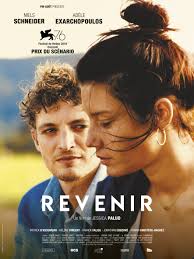
REVENIR/ BACK HOME
France, 2019, 77 minutes, Colour.
Neils Schneider, Adele Exarchopoulos, Roman Coustere Hachez, Patrick d'Assumcao, Helene Vincent.
Directed by Jessica Pallud.
This is a brief but effective film.
The focus is on Thomas, middle-aged, returning home to France from his life in Montréal where he runs a restaurant. He has been alienated from his family for 12 years, his father refusing to speak to him. However, his mother is in hospital and has asked her son to come to visit.
The film has an attractive rural setting, the French countryside. But, the drama is focused, Thomas and some scenes with his mother, the hostility from his father. And there is a complication that his older brother had been killed in an accident and Thomas had not returned for the funeral. He now encounters his widow and the young son.
The film builds up atmosphere with simple sequences like meals, Thomas minding the boy while his mother has to go to work.
There is some hope at the ending, the sadness of the mother dying, some moments of leniency by the father, but still grudgingly, and the search for the boy when his lost and Thomas bringing his father home after he fell in the woods.
There are further complications, the audience wondering what will happen to the boy and his mother, has the father will cope after the death of his wife, Thomas returning to Canada…
- The title, memories of the past, returning home, the crisis of the present, crisis of memories and hurt?
- The setting, the countryside, the farm? The house and interiors? The hospital? The musical score?
- The focus on Thomas, age, arrival, the taxi, encountering Alex, Alex falling, hurting himself, the meeting with Mona, unfolding the story, his dead brother and not coming for the funeral, Mona as a widow, the little boy? His mother, ill, asking him to come? Not speaking with his father for 12 years, going to Canada, successfully setting up a restaurant? His motivation for returning?
- Thomas going to the hospital, the reaction of his father, gruff, hostile, the visit with his mother, her tenderness, his sadness? Her death? The impact on her husband, on Mona, on her grandson, his grief?
- Thomas, reacquainted with friends, memories of the past, the situation at home, debts, selling the cattle, the discovery of the well, the flooding of the field? And her situation, prospects for Alex?
- The domestic scenes, Alex and his tantrums, his mother’s reaction? Thomas, looking after him while his mother was at work, the play, the ride, the bedtime story?
- The aftermath of the death, the father, sitting quietly, his grief, the toast to his wife and not acknowledging Thomas, Thomas’s angry reaction? The father recounting the long life yet had with his wife, constant devotion?
- Alex, disappearing, crisis, the three going out to search for him, the father falling, Thomas rescuing him, bringing him home? Alex walking to the friends, their driving him back?
- The father sleeping the chair, the next morning, the coffee, his comments, opening up a little to his son?
- The visit, Thomas ending the leak with his father’s tools, returning to Canada – and the audience wondering what connections for the future?
It Ends with Us
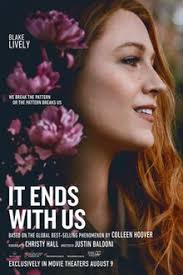
IT ENDS WITH US
US, 2024, 130 minutes, Colour.
Blake Lively, Justin Baldoni, Jenny Slate, Brandon Sklenar, Alex Neustaedter, Hasan Minhaj, Kevin McKiddc, Amy Morton, Isabela Ferrer, Emily Baldoni
Directed by Justin Baldoni.
At first, a glossy romantic tale. But, ultimately, a challenge, a drama of domestic violence. In fact, during the final credits, there is website information for any of the audience disturbed by the theme and the treatment.
The cinema staff member who gave me my ticket told me she had read the novel and was very much looking forward to seeing the film. The novel. Written and self-published in 2016 by Colleen Hoover, indicating that aspects of the plot were influenced by her parents’ experience, the book became a “must-read” when promoted on social media, especially on Tik-Tok. Then the author found a publisher and further novels. And a readership of millions.
And, now, It Ends with Us has become a box office success, $150 million in two weeks and not just in the United States, very popular in Australia.
This is a film very much geared towards the female audience. But, it also targets the male audience, challenging both. So, the female audience identifies with the central character who plans to open a flower shop in Boston – with her not so subtle name of Lily Blossom Bloom!. Her father has died, the liver something of a local celebrity in his small Maine town, her mother wanting her daughter to the funeral eulogy, to find five good things to say about him. She can’t. She doesn’t. She has left the town with memories of parental domestic violence and a happy, sad memories of a long past encounter with a young man, Atlas.
Lily is played by Blake Lively.
After the funeral, quietly reflecting on a rooftop, she watches a rather dashing type, thinking himself alone, indulging in a temper tantrum. They talk. She can’t believe he is a neurosurgeon, Ryle, and at first, neither can we. But he is.
There follows a story of growing friendship that gradually transforms into love. Some have found this part of the film too glossy, but it is nicely pleasant entertainment, Lily and some reconciliation with her mother, finding a best friend in Ryle’s sister (Jenny Slate). Ryle is played by Justin Baldoni who directed the film.
Then, sudden alarming situations arise, drama, melodrama, domestic violence, physical, psychological, apologies, failure, all complicated by pregnancy, birth, mother and child.
There have been different perspectives voiced by critics and audiences, too soft on the one hand or very important on the other. But, for an Australian audience in 2024, the statistics on cases this year of men killing women in domestic violence is alarmingly large, averaging a death the week.
It Ends with Us brings these stories to popular attention – and challenge.
- The popularity of the original novel, its influence on readers, romance novel, a novel about domestic violence?
- The title, the reference to Lily and the man she loved, but finally Lily and her daughter?
- The action in Plethora, Maine? Homes, streets, buses, the funeral, atmosphere? The contrast with Boston, high-rise, vistas of the city, apartments, hospitals, the flower shop and its development, clubs and restaurants? The musical score?
- Lily’s story, the opening, her mother’s anxiety, her father’s death, her mother’s pressure on her to give the eulogy, five points in his favour, Lily going back to her old room, her memories, the ceremony, her standing at the lectern, not saying anything, walking out? Audience curiosity about her father?
- The insertion of the flashbacks, her age, at home, seeing Atlas, squatting, stealing the food, on the bus, her buying the food and leaving the bags, his speaking to on the bus? Her standing up and kissing him, the reaction? The friendship, the bond between them, the sexual relationship? Her father catching them, his ousting Atlas? The separation from Atlas, his going to the military, disappearing?
- Lily’s mother, anxious, the phone calls, the visit to Boston, meeting Ryle, the revelations about her husband, visualised, his domestic violence, yet her loving him?
- Lily, back to Boston, on the roof, Ryle and his violent outbursts, kicking the chair, then seeing her, the conversation, on the ledge, the to and fro of the conversation, his flirting, her challenging him?
- Lily, the purchase of the shop, cleaning, Allysa arriving, the conversation, friendship, getting to work, Alysa and her husband, the friendliness, the discovery that Ryle was Alsysa’s brother?
- The film’s development of the relationship between Lily and Ryle, his work as a neurosurgeon, her initial disbelief, his skills, his charm, continued attentions to Lily, her response, as Friends, gradual breaking down of the barriers, moving in, their life together?
- Lily, the prosperity of the shop, Allysa and the friendship? Alyssa’s pregnancy?
- Lily’s mother, coming to Boston, meeting Ryle, charmed by him? The irony that Atlas was at the restaurant, Lily disconcerted, talking with him, not telling Ryle?
- The eventual proposal, Lily accepting, the ceremony? Her mother’s anxiety of not being there?
- Ryle and his charm, the initial violence, his suspicions, the visit to the restaurant, Lily and her anxiety, talking with Atlas, Ryle following, the fight? And Atlas giving Lily his phone number, concealed and her phone? Ryle’s discovering it, the confrontation, his violence, pushing down the stairs?
- At the hospital, with Atlas, discovering she was pregnant?
- The consequences, support from Alisa, condemnations of Ryle, the stories anxiety, six-year-old, with the gun, the death of his brother? Consequent anxieties?
- The separation from Ryle, his visits, with the gynaecologist, discovering it was a daughter, letting Ryle be present, at the birth?
- Lily then assertive, love for her daughter, the friendship with Ryle, but the divorce?
- The consequences, the years passing, meeting Atlas again, possibilities for a future?
- The credibility of Ryle and his violence, domestic violence, cruelty, denials, repentance? And the message of the film about domestic violence?
Borderless Fog
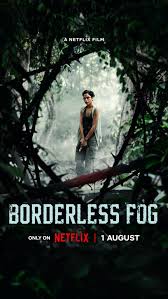
BORDERLESS FOG
Indonesia, 2024, 111 minutes, Colour.
Putri Marino, Yoga Pratama, Lukman Sardi, Yudi Ahmad Tajudin.
Directed by Edwin.
A 2024 film, streamed on Netflix, Borderless Fog offers an opportunity for world audiences to have easy access to watching a contemporary Indonesian film, a thriller, murder mystery, detection. It also offers an opportunity to appreciate something of different styles of life, Asian atmosphere, racial complications, cultural traditions.
The setting is Borneo Island, the border between Malaysia and Indonesia, people moving across borders, passport requirements on the one hand, corruption and brown paper bags with cash on the other. It is remote from the capitals, a mixed area with Indonesians, Malays and local tribe, Dayaks.
The photography of the beauty of the island is striking, panoramic views, the density of the forests.
There are some grim aspects of the plot, serial killings. And, while the killings themselves are not shown, there are gruesome aspects of the results, bodies and severed heads. The local police are investigating, but few results.
Borderless Fog is very interesting in its central character, a female police officer sent from Jakarta, contemporary look and style, strong-minded, physically tough, taller than many of the men (and actress Putri Marino perhaps reminding us of the young Sigourney Weaver). She clashes with the local head, of course, finds support in his assistant, encounters a cooperative shopkeeper, works with a fiery local who wants to take the law into his own hands.
The plot is often quite complicated, requiring audience attention as to who is who and who is supporting whom.
Suddenly, the focus is on a van, a woman driving, young girls in the back, stranded at a swollen river – and then the revelation of the driver being one of the victims, and the realisation that this is a situation of human trafficking, proliferating along the Malay/international border.
Audiences will find the comparison between the detective’s methods and activities with those familiar from American or British police investigations very interesting. And, the officer herself is burdened by an episode in her past, pressure from her father, examples of police pressures and influence.
There are some twists, questioning of loyalties, the audience puzzling over who amongst the possibilities of suspects has actually been doing the killing, and why, possibly a crusade against the traffickers.
Underlying the realism of the killings and the investigation, are suggestions of ghostly presences in the forest, and influence on the behaviour of the locals. The filmmakers have decided to resolve the mystery but, with the ending, also suggest that there might be something in the mysterious ghostly presences in the forest.
Death on the Tyne
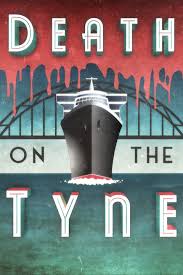
DEATH ON THE TYNE
UK, 2018, 87 minutes, Colour.
Johnny Vargas, Sion Gibson, Tony Gardner, Don Gilet, Georgie Glen, Sue Johnston, Sheila Reid, Doon Mackichan, Felicity Montagu, James Fleet.
Directed by Ed Bye.
This is the second in a trilogy of murder mysteries featuring Johnny Vargas and Sion Gibson. Murder on the Blackpool Express the first, Dial M for Middlesbrough the third.
Movies and television have reminded us of the various levels of comedy in the British repertoire. In fact, there have been some brilliant comic personalities in screen presence, performance, verbal dexterity, wit, a worldwide reputation.
On the other hand, thinking of the range of broad comedies, geared especially to the popular television audience, they are pretty straightforward, not particularly subtle, enjoyment for the moment.
This series has been compared by some to the Carry On films. When they first appeared in the 1950s, the Carry On films were very popular but dismissed by many as too lowbrow. But, time has been very kind in the reassessment of the Carry On films and the talent of their casts.
Probably not so for this film. The characters are more or less as expected, talk and behave directly, not much nuance or subtlety. Johnny Vargas and Sion Gibson own a tour agency, not many customers, here just three elderly ladies, all set for a ferry trip from Newcastle to Amsterdam. They have a secret – which involves their inheriting a great deal of money from a dead friend.
The other characters are the range of people found on the ferry, the captain, his assistant about to take over, his fiancee the ship’s entertainer, her lover smuggling himself on board, and the manager of the passengers.
Some deaths, the unmasking of the unlikely killer, some silly complications with the elderly ladies and the death of one of them (by mistake!), Attempts at detection, some comic moments, many corny moments, an 87 minutes’ rather lowbrow British entertainment.
Alien: Romulus
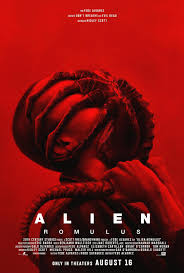
ALIEN: ROMULUS
US/UK, 2024, 120 minutes, Colour.
Cailee Spaeny, David Jonsson, Archie Renaux, Isabela Merced, Spike Fearn, Aileen Wu, David Betts, Ian Holm facial and voice.
Directed by Fede Alvarez.
Reviewer advice. First, this is definitely a film that needs to be seen in the cinema, in the dark, the impact of a large screen and high-tech sound system. Second, this is a film of continued tension, the skill in making its audience feel on edge throughout the film, prolonged time unrelieved, enhanced because this is a serious narrative futuristic story incorporating an atmosphere of terror.
For older audiences, it is amazing to think that it is 45 years since Ridley Scott directed the original Alien, its making such an impact in its time, and the emergence of Sigourney Weaver as Ripley, setting a mark for women in leadership/warrior roles. Alien: Romulus is the seventh Alien film, set in time between the original and Alien 2.
There were a number of Ripley sequels, there were also the two prequels, Prometheus and Covenant. With Alien: Romulus, there is a younger director, Fede Alvarez from Uruguay, who made his mark with some American horror thrillers, Evil Dead and Don’t Breathe. But, while he certainly draws on his capacity for horror and terror, this is a ambitiously vast project. And, it has the advantage of many references to the original film, quite a number of parallels in the action. It opens on a planet light years from Earth, a sunless planet, owned by the mining company, the men and women there virtually slaves, trapped in hard labour.
The main part of the film, however, is on the space ship, large but claustrophobic, high-tech but menaced mysterious and ugly creatures. They resemble those in the original film as do some of their origins (memories of creatures emerging from human bodies).
This time the characters are young, in their 20s, trapped in the mines, discovering a possibility for escape, to get to the abandoned spaceship and travel to a freer destiny. The central character is Rain, played by Cailee Spaeney, a pleasant and enterprising young woman, the firm friend of a high-tech android, Andy (a most sympathetic performance by David Jonsson, nicely genial and indulging in puns and wordplay, then reprogrammed to higher intelligence and loyalty to the mining Company, his skills essential for escape and survival. There is the sympathetic Tyler, his wilful and obnoxious cousin, Bjorn, Tyler’s pregnant sister Kay, Bjorn’s girlfriend, Navarro.
Most of the action, of course, is on the space ship, the discovery of the alien creatures, the sense of menace and terror, refuge and escape in various parts of the space ship, Rain assuming more and more leadership, becoming the new Ripley.
The film works well as a contribution to the Alien franchise, satisfyingly linked to the previous films and the original, but powerful in its ability to keep audience nerves on edge for a great deal of the action, at times unrelenting tension.
- The seventh Alien film? 45 years after the original? Audience expectations, the various sequels, other explorations of the themes? The success of this film?
- The time setting for this film, after the original, prior to Aliens 2? The original film, Ripley as survivor and her appearance on the other films? Not in this film? But the connections with the first film, the space ship, its mission, the experimentation, the creatures, the androids, the company, explorations of space, for the planets?
- The time and the place, light years from Earth, futuristic, space exploration and travel? The opening, the mines, the company, contracts, slave labour, Rain and her wanting to leave, the digging? Her relationship with Tyler, Tyler with Bjorn, Bjorn and his relationship with Navarro, Kay and her pregnancy, and the importance of the android, Andy, sympathetic, the number of puns and play on words?
- The atmosphere of the film, the creatures and aspects of horror and menace, the atmosphere of terror and its pervading the film and its effect on the audience?
- The oppressive town, mining site, no sunlight, the humans as slaves to the company? Tyler, his reaction, gathering the group, the plan, to travel to the space ship, to travel to the distant planet? Their working together, the escape, arrival on the space ship, Romulus and Remus?
- The human characters, Rain, her experience, her wanting to leave the mine, hesitant, trusting Tyler, ordinary but about to emerge as strong heroine? Tyler, leadership, hopes, keeping the group together? The contrast with Bjorn, obnoxious, critical, sabotaging? Navarro, her character, with Bjorn, with the group?
- Andy, the sympathetic android, personality, British accent, manner, human qualities, intelligence, the bond with Rain, as a brother? And the range of puns and jokes?
- The episodes on the space ship, the technology, the discovery of the creatures, the pursuit, tenacity, closing doors, isolating? Andy and his contribution, helping? Bjorn and his antagonism, his decisions, the escape, death? Navarro, the creature clutching her, trying to disengage it, ultimately her dying? Kate, her pregnancy, her being trapped?
- Andy, the control, loss of power, Rain and her substituting the mechanism, his greater intelligence, but at the service of the company? Rain and her ingenuity, the dead, the destroyed androids, then mechanisms?
- The importance of Rook, the link with Ash from the original film, the use of Ian Holm’s face and expressions, similarity a voice? His explanations, at the service of the company, the mission, the creatures, the power? Rook and his trying to control Andy? Confronting Rain? His destruction?
- The crisis, the Xenomorphs, vicious, the visual appearance, memories of the creatures of the original film, their infiltrating the human bodies, the shock and then bursting forth? Kay, being trapped, the creatures, her giving birth to the monster, its confronting Rain and Andy?
- Rain, using her wits, ingenuity, relying on Andy, transforming him back to his original relationship? Rain, the dangers, the confrontations, with the monster from Kay, the deaths of the other members, her becoming a new Ripley?
- The buildup to the climax? The dangers, Andy and the rescue, rain and her success, setting for the future planet?
Acknowledging Kevin Ehlefeldt MSC, 95
Acknowledging Kevin Ehlefeldt MSC, 95
Kevin turns 95, August 21st. Kevin made his profession as an MSC brother on February 26th, 1948 – which means almost 30 years serving as a brother and several apostolates. In the early years, he was at Chevalier College as well as Sacred Heart Monastery, Croydon.
In the 1960s and 1970s, he spent many years working in the Annals Office at Kensington and in the development of Chevalier Press.
His studies for the priesthood during the latter part of the 1970s were at St Paul’s National Seminary. He was ordained on August 18th 1979.
His priestly ministry was in parishes, including Camp Hill, and, in later years, in supply in parishes in the northern rivers area of New South Wales.
He was one of many sets of brothers in the Australian province, family brothers, his older brother, John, dying at the age of 102.
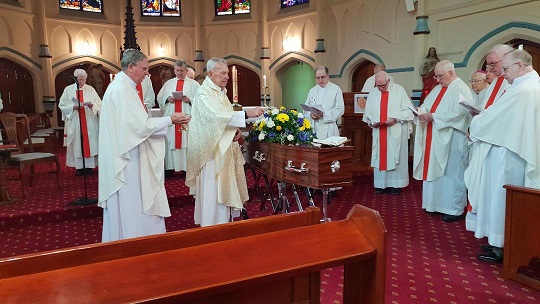
Kevin presided at John’s funeral.
Kevin lives at the Sacred Heart Monastery, Kensington.
Brian Gallagher visit to the new Heart of Life Centre, Croydon.
Brian Gallagher visit to the new Heart of Life Centre, Croydon.
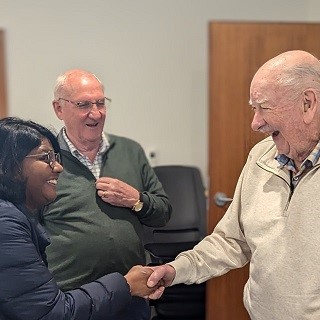
When the Centre was blessed on the Feast of the Sacred Heart, it was a disappointment that Brian was unable to be there after his time in hospital. Heart of Life now has a permanent home, beautifully renovated interior. Project manager, Barry Smith, was back in Melbourne and drove Brian out to visit.
Students were delighted to receive a spontaneous visit from Fr Brian Gallagher msc, to Heart of Life today!
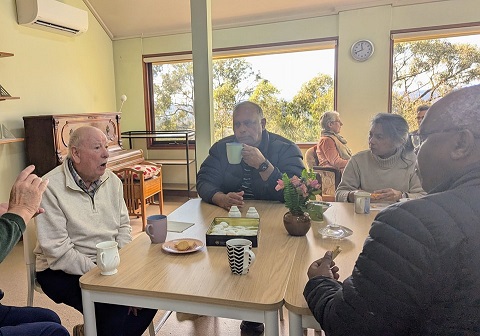
Siloam student, Amy, an Infant Jesus Sister from Malaysia, expressed what a joy it was for her to meet the man in person! "We've heard the name, we've read your books, it's so good to finally meet you!"
Yon, Divine Word Missionary, added, "Your name always appears in our footnotes!"
George, a Christian Brother from Kenya remarked, "If it weren't for you (Brian, who started the Siloam program over 45 years ago), I wouldn't be here in Australia!"
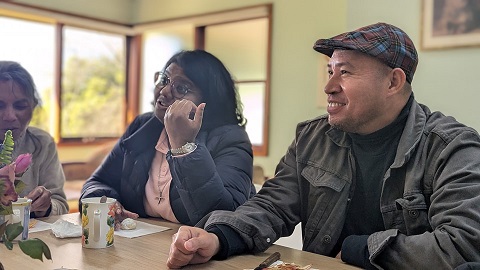
Amy, centre, Yon, and George can be seen in the previous photo, right.
Sadly, lecturer Peter Hay had to corral the group back into class... Despite protests in jest that we were sitting with our master.
With thanks to Gig Anderson for story and photos, Heart of Life Centre Facebook page/
William Brennan: From Downlands Student to Priest
William Brennan: From Downlands Student to Priest

William Brennan (2016), a significant milestone in his life - his presbyteral ordination in Townsville in June 2024. Ahead of his ordination, we reached out to William to find out more about his journey from Downlands Student to Priest. Here is what he had to say.
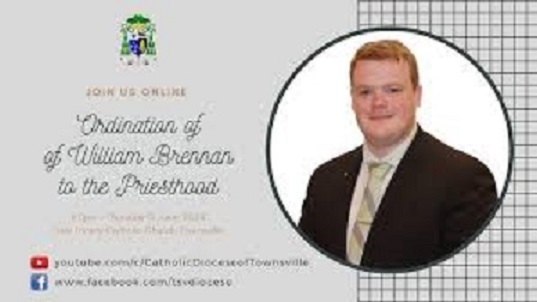
Q. What are some of your memories of your time at Downlands?
One of the things that I fondly remember is the sense of welcome that I felt. Arriving at the beginning of Year 11 after being at only one
other school in my life was a big adjustment, but my first day at Downlands gave me a real sense of being a part of the Downlands community.
In terms of specific memories, lots of little snapshots come to mind: cramming in study the morning of a maths exam up in the library, starting rugby pre-season on a somewhat-dusty Lords Oval, heading down to old Cody for our study period, exploring McKenna Hall after it was renovated, hymn singing practice with Fr Paul in the Chapel, early morning male choir and band practices, and afternoon cricket or rugby training. All of these snapshots are little things that remind me of my Downlands experience and I smile thinking about them all.

Q. How did Downlands shape you, and contribute to your path into priesthood?
I think one of the biggest ways that my time at Downlands contributed to my path into priesthood was that I was invited to broaden my horizons and step into new experiences.
Opportunities like helping tutor refugee children at Toowoomba Refugee and Migrant Services (TRAMS), participating in a leadership camp near Murphy’s Creek, and encountering students from many different backgrounds helped me to grow in my understanding of myself and of the different situations of others. These are both central to the life and ministry of a priest.
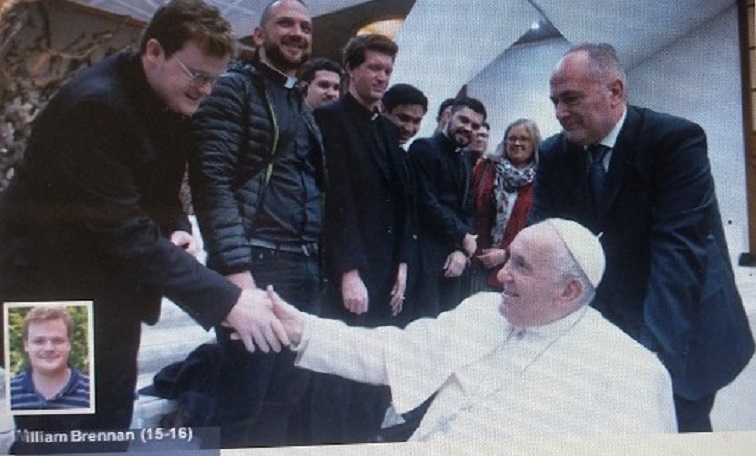
Q. What are you most looking forward to in the future?
It might sound a bit plain but really, I’m just looking forward to being in a position where I might be able to help people. I don’t know where life will lead me (like all of us) but I am happy to keep trying to follow where God calls me and try to help those who I come across.
